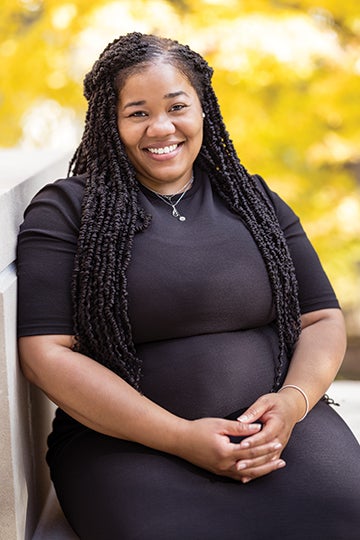Momentum for Change
Attorney Kenitra Brown builds on years of experience to advocate for changes in criminal legal systems across the United States.

Kenitra Brown ’07 was 5 years old when her father went to prison. The man who fixed her hair and let her tag along to church choir practice was convicted of running a car theft ring, a charge for which he maintains his innocence.
Because the justice system mistook him for someone with the same name who committed a separate crime, he ended up with a 65-year prison sentence. Brown, who grew up in Dallas, noticed more neighborhood family members, friends and neighbors going to jail, too. “As I watched them go away, I heard people say, ‘If he had just had a lawyer.’ So I decided, I’m going to be a lawyer and help people come back home,” she says.
Brown’s childhood neighborhood is still among ZIP codes with the most incarcerated residents in Texas. Decades of over policing have contributed to inequitable access to city services, school funding and affordable child care, she says.
Brown, who has a law degree from the SMU Dedman School of Law, now is the director of engagement at SMU Law’s Deason Criminal Justice Reform Center. She spearheads its community engagement initiatives and advocacy and engagement efforts with criminal justice research and reform advocates across the nation.
The U.S. incarcerates more people than any other country in the world, with marginalized communities disproportionately affected. Black people comprise just 13% of U.S. residents, yet they’re 40% of the incarcerated population. Black women are incarcerated at twice the rate of white women, and women are the fastest growing segment of the incarcerated population.
“We have an obligation to be a better country. We know better, so we should do better. We have to do this top down,” Brown says. She connects activists from across disciplines with innovative ideas to inform policy reform. People need help with factors keeping them in the system — mental health, addiction and housing. “Incarceration is not the answer or solution,” she says.
We have an obligation to be a better country. We know better, so we should do better. We have to do this top down. — Kenitra Brown '07
Brown returned to SMU after four years spent building her own business as a family and criminal law defense attorney. Her mother, who started a business as a single parent, inspired her. At Rice, Brown majored in political science, religious studies and policy studies.
When she worked for the Texas Department of Criminal Justice’s parole division after her sophomore year, which coincided with her father’s release on parole, Brown got a firsthand look into the challenges of life for parolees. “It’s hard to be hopeful when it always feels like if you make one mistake you’re going back to prison,” Brown says.
Despite the obstacles to improving the legal system, Brown is optimistic. “The murders of George Floyd and Breonna Taylor laid bare the systemic inequalities across systems,” she says, “and the pandemic exacerbated those inequalities sparking worldwide protests, actions and conversations. There’s momentum for change.”
— Deborah Lynn Blumberg
